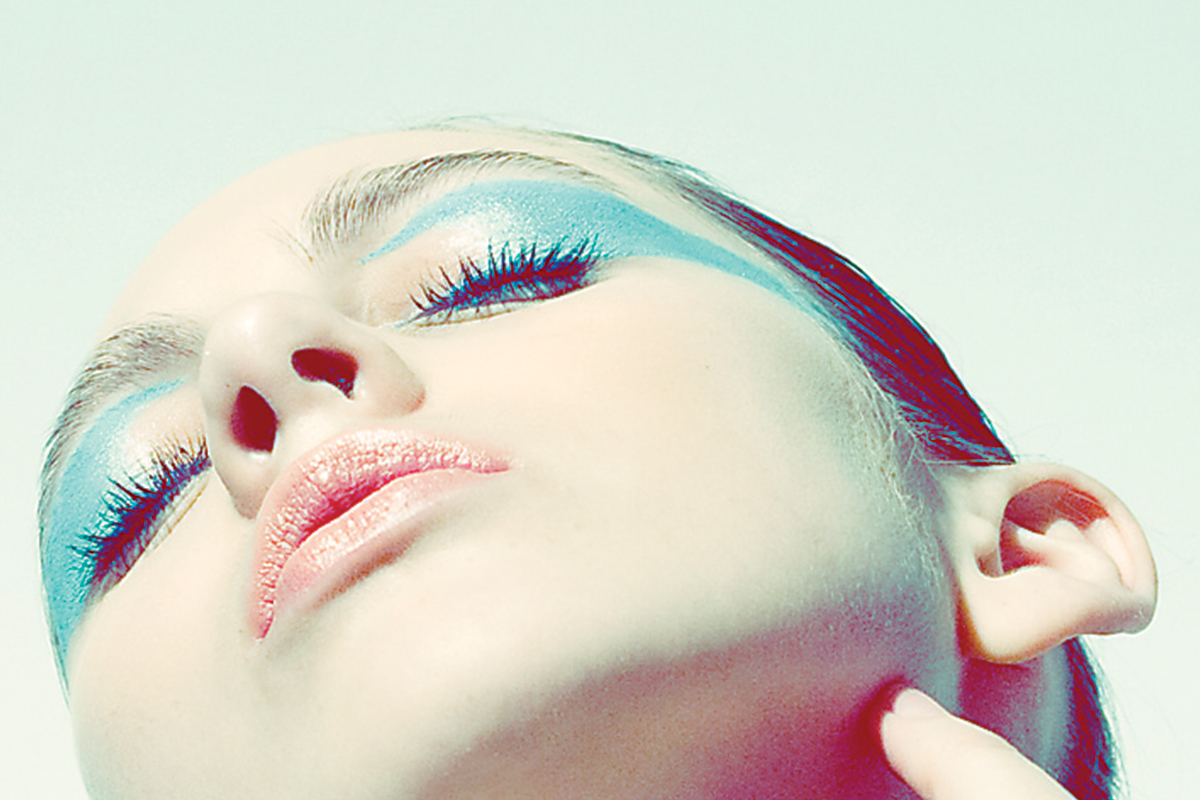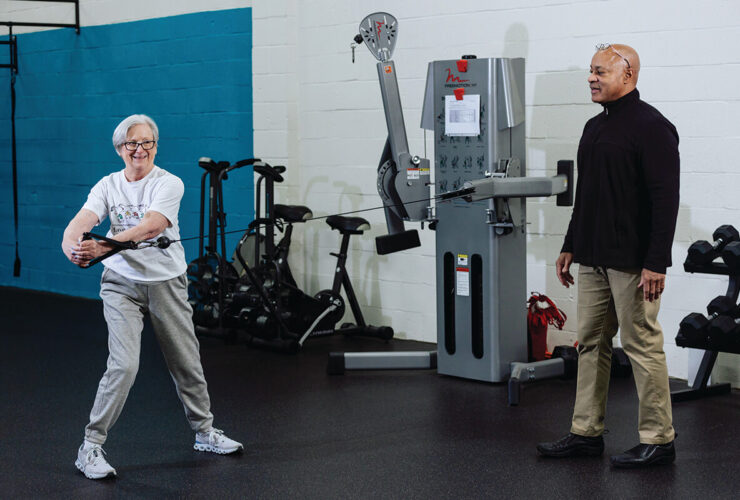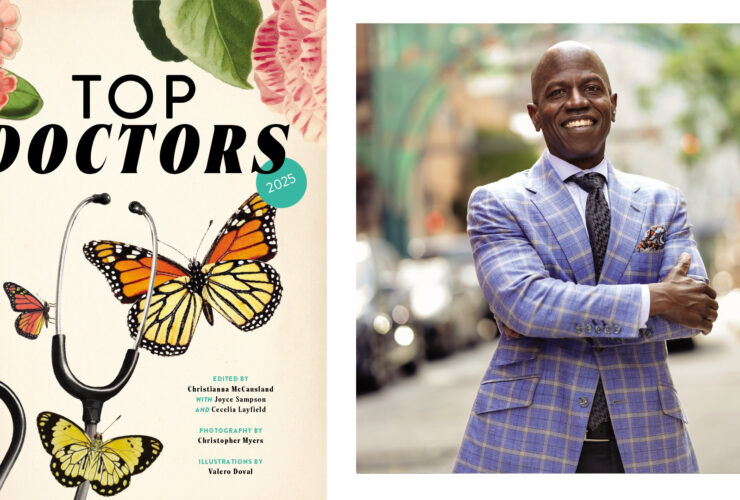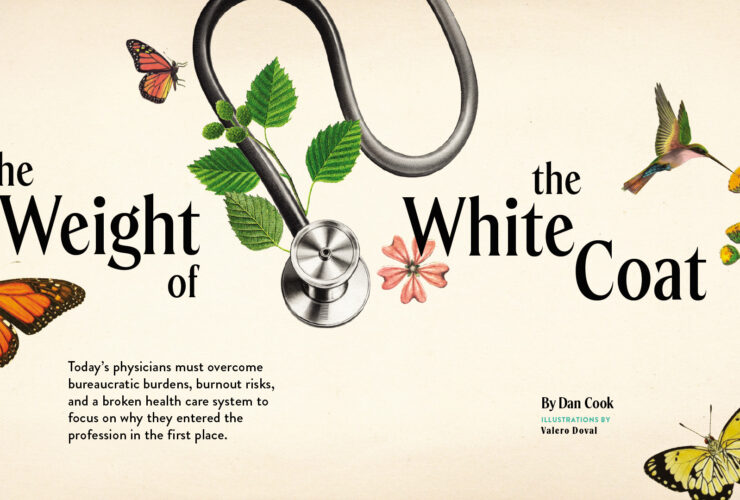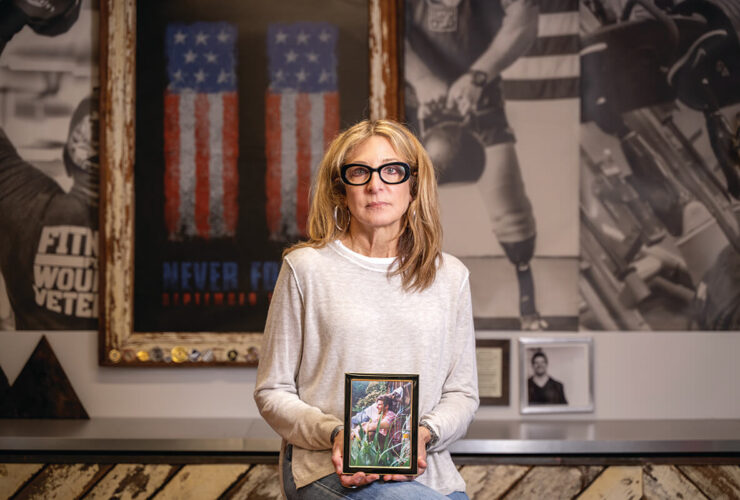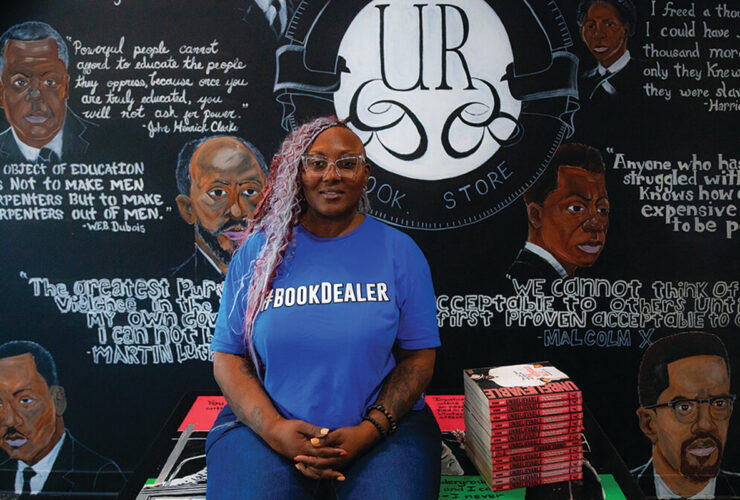
Our cover story is an exploration of beauty in all its forms. We found it in the five women on our cover, in the revealing roundtable we hosted with them, in A conversation about male standards of beauty, and in the small businesses in Baltimore that encourage self-care and acceptance on a daily basis. Our conclusion? Beauty is everywhere. You just have to know where to look.
Health & Wellness
The Beauty Issue
Our cover story is an exploration of beauty in all its forms. We found it in the five women on our cover, in the revealing roundtable we hosted with them, in A conversation about male standards of beauty, and in the small businesses in Baltimore that encourage self-care and acceptance on a daily basis. Our conclusion? Beauty is everywhere. You just have to know where to look.
Styling Assistance by Karmen Osei. Makeup by Jamaya Moore. Makeup Assistance by Perryn Morris. Photo Assistance by Travis Marshall. Set staged by Wishbone Reserve. Shot on location at Lift Yoga + Strength.
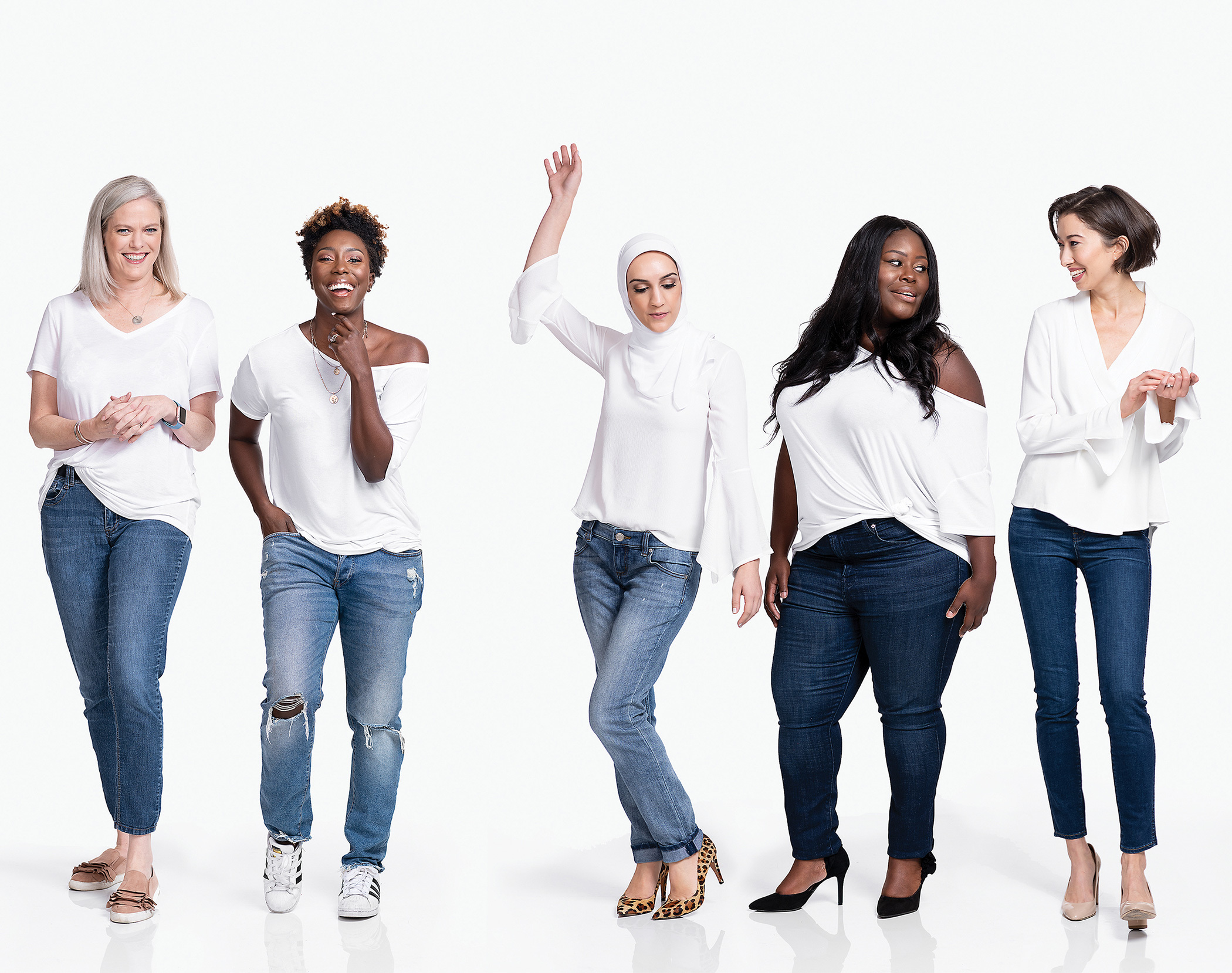
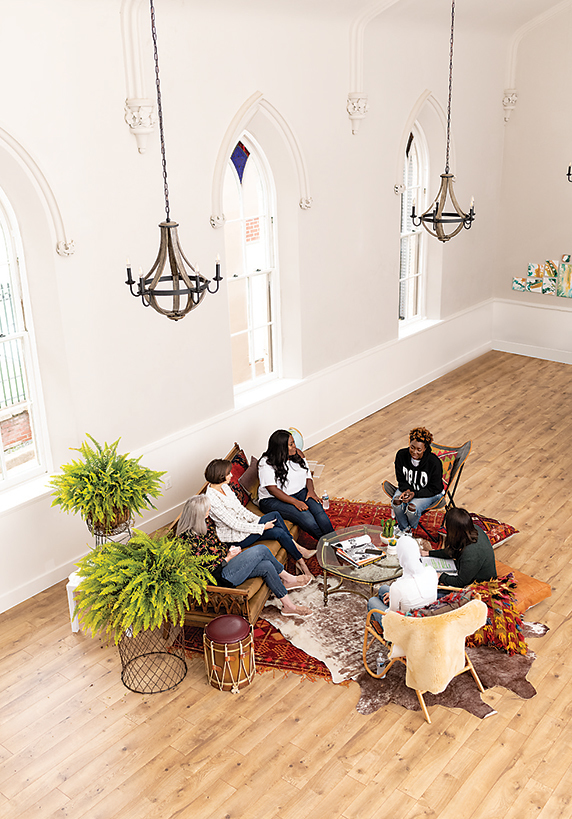
What if you were asked to name someone beautiful in our culture today? Who would you think of? A Victoria’s Secret Angel? A popular YouTube star? Idris Elba? Yes, they are all “beautiful,” but too often our definition of that word is way too narrow.
Whether it was the porcelain skin of 18th-century France, the slim silhouette and bobbed hair of the roaring ’20s, or the hourglass figure favored in the ’50s, the notion of the physical ideal, particularly for women, has evolved over time. But one thing has remained constant: a woman’s need to live up to those impossible standards in order to feel beautiful. Beauty standards are constantly shifting, even within our lifetimes (think the pencil-thin eyebrows of the ’90s and the perfectly contoured faces of the Kardashians so popular a few years ago). But now there’s a new wrinkle: We exist in a world where everything can be faked or fixed. Any imperfections or minor flaws can disappear with the swipe of a finger or the right phone app. And young women have grown up with this technology. We have been taught from a young age to alter ourselves in order to be beautiful.
The mass media leads the way by presenting and celebrating these ideals that are unattainable for most people and so often symmetrical, thin, and white. The images we are told to digest from big companies, celebrities, or Instagram feeds are oftentimes heavily Photoshopped and processed through many filters. The real danger starts when we begin to compare ourselves to these images. We aren’t born with insecurities, we are taught to be insecure.
Well, we say screw that. We are dedicating this entire issue to the fact that beauty is multidimensional and deeply personal. The truth is that beauty is intrinsic, existing naturally within us all, and the fewer filters we apply, the clearer it is for our inner splendor to shine through. When you view beauty through that lens, there is no room for harsh criticism or negativity (shout out to Travel + Leisure magazine, which named Baltimore the ugliest city in the country). We happen to think Baltimore is beautiful in its diversity, creativity, and humility.
We found all of those things and more in the following lively and candid conversation about beauty standards among five local women. And yes, while a good skin cream or proper hydration can do wonders, beauty is less a look and more a feeling. So take time to celebrate yourself and each other, as we are, and as we are supposed to be. Empowered.
How do you think your upbringing affected the way that you see beauty in the world?
Alexis Wilkins: I have a sister who is very close in age, and growing up we were always referenced as “the little dark one” or “the tall light one.” There was always a comparison happening between us, and it kind of made me crazy.
Dayna Bolden: When I was a young girl I used to always hear, “You’re pretty for a dark-skinned girl.”
Wilkins: Yup.
Bolden: Like what does that mean? You’re pretty for a dark-skinned girl? Why can’t I just be pretty or beautiful? I never want my daughter to ever hear that. It’s just, “You’re beautiful.” That’s it.
Lauleh Aslani: It’s like a backhanded compliment.
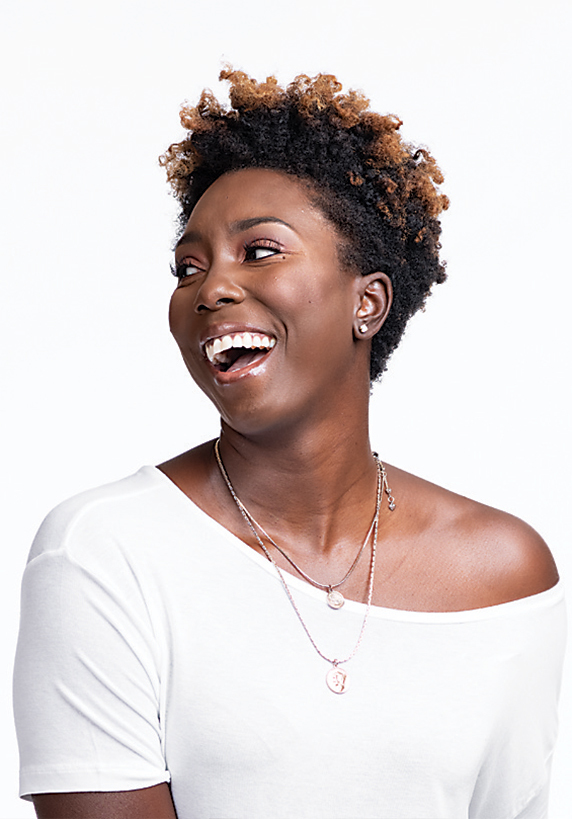
on Stereotypes:
“Even to this day if you google ‘beautiful woman,’ the first thing you are going to see is a white woman.”
Dayna Bolden | Entrepreneur/Blogger
Bolden: It is. And as a child I didn’t get it, but now I get it. It’s like they were shading me actually. Wilkins: I hear the same things. “You’re pretty for a plus-sized woman.” Can’t I just be a beautiful plus-sized woman? Why is that separate?
Aslani: I used to get, “You dress really nice for a Muslim hijabi woman,” and it made me think, like, what’s your idea of a Muslim woman? What are you supposed to look like? I was born and raised in the Midwest and felt a clash of being American, Persian (my ethnicity), and Muslim (my religion). I hear from one side and everyone’s like, “You dress really nice for someone who wears a hijab,” but then the Muslim community is saying, "You dress too American.” Everyone has an opinion, and I definitely went through phases, but thankfully I had an older sister and my mom to help guide me through, because I would look at magazines or the internet, and there was never Muslim representation in the media.
Vanessa Ulrich: My mom is white, and my dad is Thai, and I had the benefit of living in Thailand for six years when I was growing up. My mom really helped shape my outlook on beauty and did a really good job of teaching me to love and appreciate all of my features. My eyes are like my dad’s, but my hair is more like hers, and it helped me create this whole sense of self.
Julia Marciari-Alexander: I grew up in the ’70s in an academic environment outside of Los Angeles, so it was both L.A. and academia all in a supercollider. And it was always, are you smart, or are you pretty? But really for me it was all kind of summed up in Charlie’s Angels, who were the famous people of my moment. You had Farrah Fawcett, Kate Jackson, and Jaclyn Smith, and you chose which one you wanted to be. Kate Jackson was the slightly homely, super-smart Angel, and so I always wanted to be Kate Jackson—mind you, I look nothing like her. But you had to make this distinction, which is just super false. You can be both, you can be neither, you can be you.
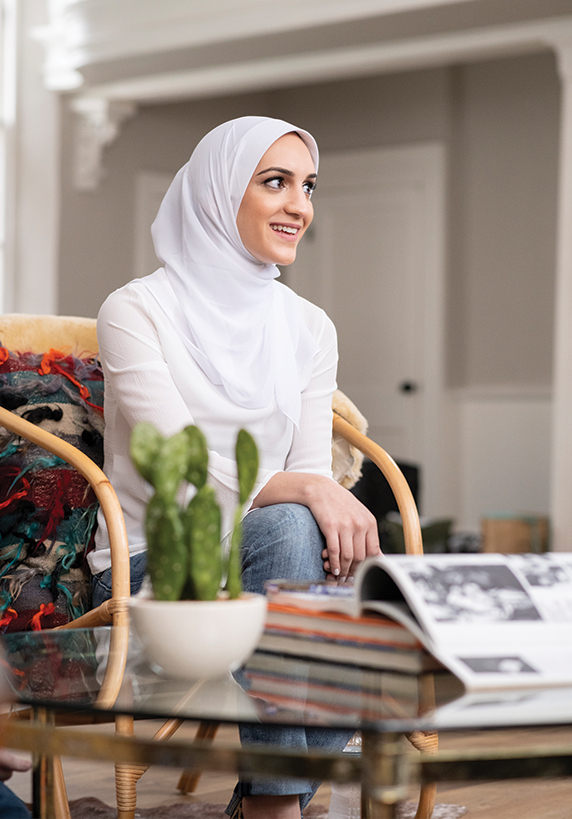
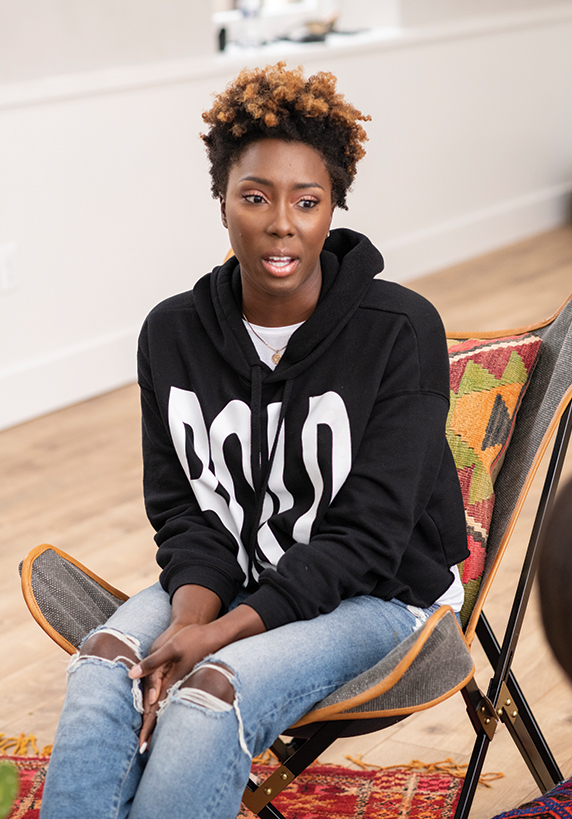
What do you think makes a person beautiful?
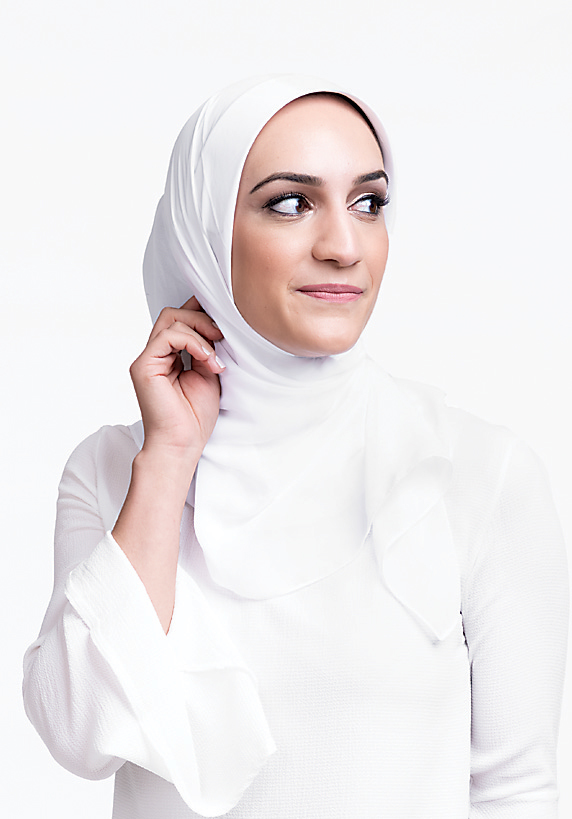
on social pressures
“As far as social media goes, people are only going to show their happy moments."
LAULEH ASlANI | Executive Health Coordinator at Sibley Memorial Hospital
Ulrich: It’s when a person’s charisma, intelligence, humor, and kindness comes through. I mean, we all take so many pictures of ourselves, and that’s one way of us representing who we are. Looks are definitely part of it, but for me, beauty is really about personality traits that someone displays when you are right in front of them.
Bolden: I agree. It’s definitely an energy thing for me, because you could have the most beautiful person in the world, and if they act nasty, they’re not beautiful to me anymore.
Aslani: Someone’s personality really draws me to them and can make them seem even more beautiful. There are so many people who we follow online, and you might think you have an idea of who they are, but then you meet them in person and they are standoffish or different than you expected. But then you meet some people and they are even more beautiful in person because their personality shines through.
Wilkins: I think that’s how the digital age has changed things, because you can look at a magazine from 20 years ago and all you see is a picture, you don’t know anything about that person, but with social media you are able to show more than just your outward appearance.
Marciari-Alexander: I think when a person inhabits their passion publicly is when they become beautiful. You could call it animation or enthusiasm, but when you see someone light up from within and they become sort of iridescent because they are talking about something they really care about, that’s when you truly see them as opposed to the construction of themselves that they are creating. I talk with my kids a lot about the need to question people who are on YouTube and how that is their profession. You don’t know them. You may think you know them, but what you really know is the construction of themselves that they are presenting to you.
How do you think the concept of beauty has changed over the years?
Marciari-Alexander: I’m really interested in the notion of whether there is an inherent beauty that is beautiful to everyone or if beauty is always subjective. I think it is probably always subjective. We spend a lot of time and money as a society constructing norms around beauty that people feel they have to conform to. And that goes all the way back to the very beginnings of the Egyptian world. One of the things I love about this moment in time is that I feel like there might be a little bit of an explosion of the normative construction of beauty that comes down from one group in society. Whether you’re in the Far East, the Middle East, Europe, or America, each culture has traditionally had its own normative sense of beauty over time, but what I think is really beautiful now is that we are starting to see that those norms change even within one culture or across cultures.
Ulrich: And I love how social media has helped us to do that.
Marciari-Alexander: Absolutely.
Ulrich: It allows everyone the ability to show themselves at their most confident and beautiful and has been able to bring together so many different voices.
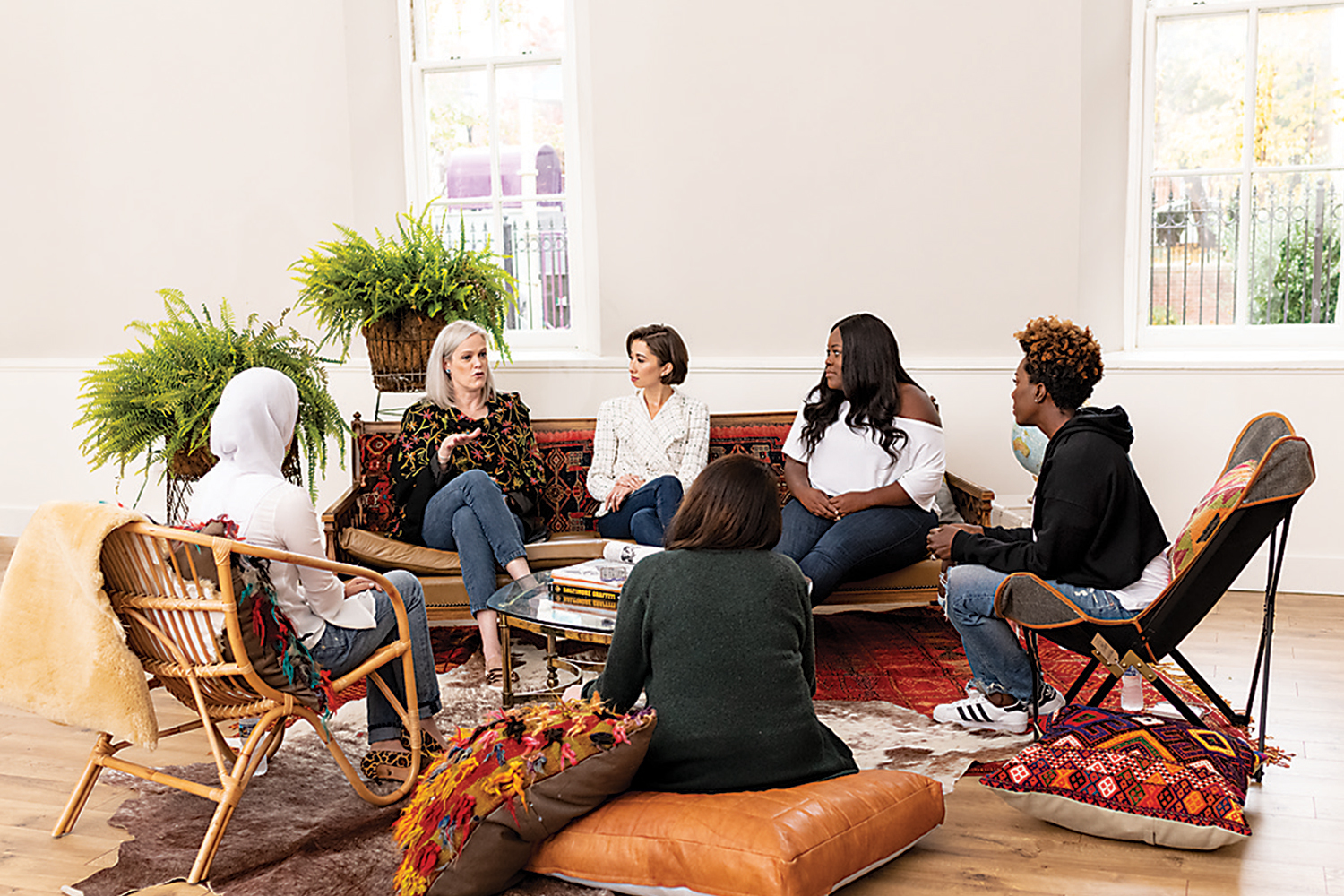
Have you ever felt stereotyped based on how you look? How do you deal with that?
Bolden: All of the time. As a black woman we’ll get stereotyped as being aggressive or being mean. For me, I just try to be myself no matter what and in any situation.
Wilkins: I definitely agree. The standard of beauty is different for black women. For example, you can have natural hair and be able to express yourself in that way, but I don’t feel comfortable doing that, and I think that is just based on my life experiences. I want to still have long, straight hair. My hair is not long, and my hair is not straight in real life, but I still look for those types of ways to align myself with that type of standard of beauty. It isn’t always the best thing, but that’s just how I feel comfortable, and when I’m comfortable, I feel beautiful.
Bolden: Even to this day if you Google “beautiful woman,” the first thing you are going to see is a white woman. I’m dark-skinned, and 20 or 30 years ago that wasn’t considered beautiful. It’s important for me to change the standards of beauty, especially for black women, by showing a dark-skinned woman that she is beautiful, that she can wear her natural hair and still be beautiful.
Ulrich: And I think for women specifically, the way beauty has historically been taught as the epitome of what a woman should be, it’s important to show all of the different kinds of beauty to young girls as they grow up so they know that there isn’t just one standard that they need to aspire to.
How do you think beauty standards differ between women and men? Do men have it easier?
Marciari-Alexander: Well, I can imagine that all of us get more comments on our clothes or on our hair or the “You look great.” But when you’re talking to a male museum director it doesn’t start with “Oh my gosh, you look great,” or “Your clothes are really tight,” or “Your suit is really inappropriate.” I mean, I have had people tell me that my skirt is too short or that my blouse is too open. Just don’t comment. It’s lovely and nice to have people say how great you look, but on the other hand, you’re like, I’m in a professional setting right now. Thank you, but hmm . . . maybe not.
Wilkins: I don’t know what male beauty standards are. There isn’t really conversation around what a man looks like. It’s more about what a man thinks or what a man does.
Marciari-Alexander: I am 6 feet tall, and my husband is 5’6” and a runner, so he is really fit and small, and he will tell you that in his career up until now, he’s always felt that he gets looked at differently because he doesn’t conform to what people imagine a man in his position to look like. I actually think that men do struggle with this, but we aren’t providing the language to talk about it. I love the idea of saying that there are implicit standards of male beauty or appearance, so let’s call it out and let’s say, “Hey, that’s not okay,” or “Hey, everybody looks great.”
Do you ever feel intimidated or weighed down by the pressure to look a certain way to advance your career?
Bolden: I think it can be hard trying to balance people’s expectations with my own brand and still remain authentic. Social media is constant, and I don’t try to be perfect, but I am trying to put my best foot forward every day because of the pressure. I have 65,000 people following me on Instagram, so it’s like I can’t go out and look crazy.
Aslani: I put pressure on myself, but in a good way, because I want to represent Muslim Persian women in the workplace well. If my appearance is put together, then I’ll get a positive reaction out of patients and out of my colleagues. I do believe that my wearing a scarf has helped me in many ways to get the job I currently have. When I was in school, professors knew my name the first day of class. I kind of stand out, and that can be a good thing or a bad thing. I see it like I am representing a tribe of other Muslim women, so I kind of need to have it together.
Ulrich: I work for a boutique health care strategy and marketing agency and deal with 99 percent of my clients over the phone, so I don’t have to do my hair or put on makeup for work. But then outside of work I try to look a little more polished.
Marciari-Alexander: I would say there is absolutely no correlation of doing my job well and the pressure to be beautiful or dress one way or another. Although the presumption is that people who work in the arts industry accessorize really well!
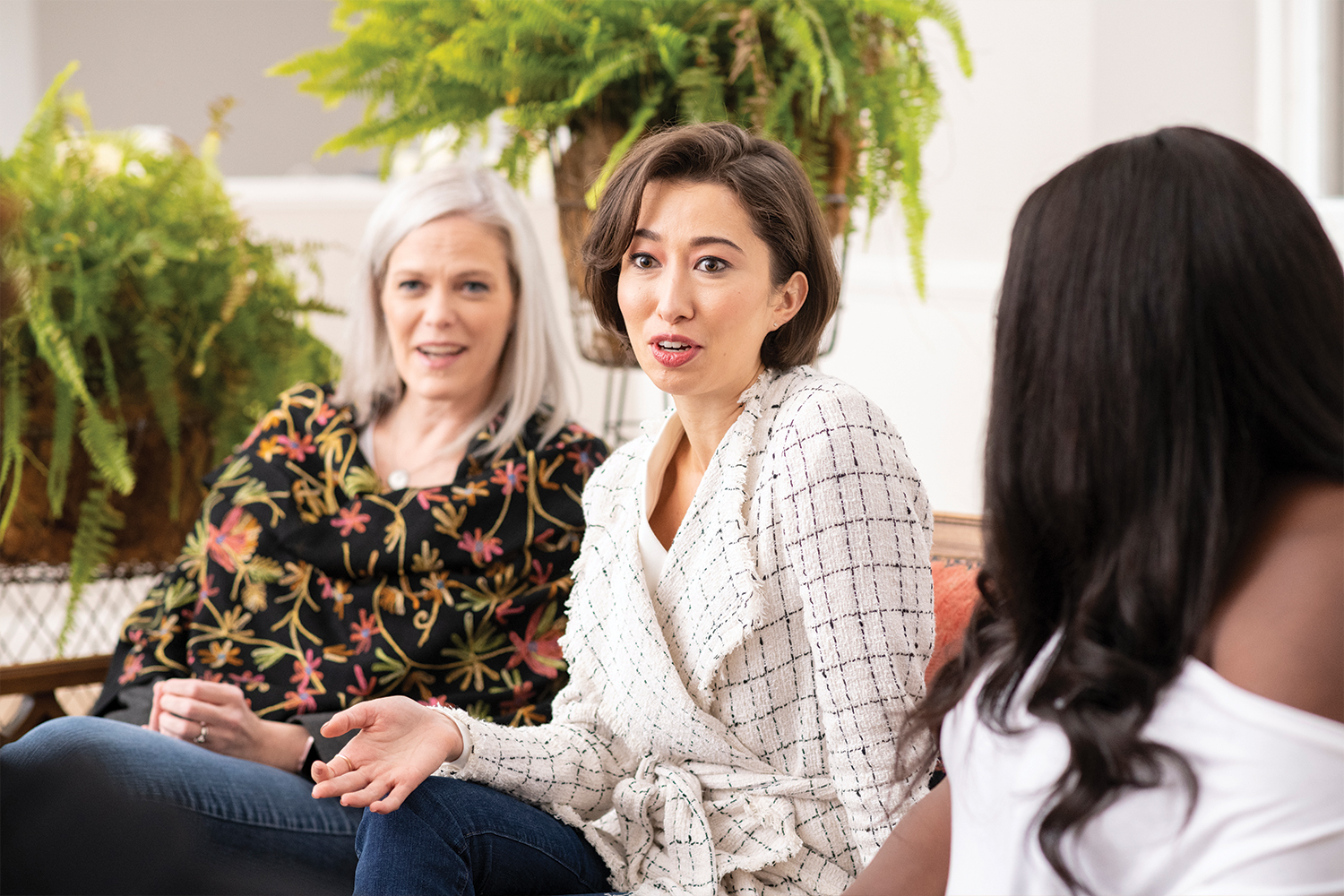
Do you have any insecurities that you will always carry with you?
Marciari-Alexander: When I would tell people that I grew up in California they would say, “No you didn’t, you’re not tan.” And the fact is, I don’t tan. I get really, really sunburned. I always felt that my super-duper white skin and my super straight hair wasn’t the picture of ideal beauty in the world that I came from. It was blonde, beach waves, and tan skin. So even though theoretically I have the same attributes as the standard of beauty, I never felt that way. Now, I got to age 50 and I was like, I don’t care, I’m fabulous . . . and my skin looks awesome!
Ulrich: I think for me it’s that I have under-eye circles. I have very thin skin like my mom and my grandmother, and so if I have one late night out I get bags under my eyes. I used to try to Photoshop them out of photos, but now I think maybe I should just wear them as a badge of pride, right?
Marciari-Alexander: Absolutely!
Ulrich: Because I do a shit ton of stuff.
Aslani: I think it just says you’re working hard. You’re hustling!
Marciari-Alexander: It’s like gray hair. Ladies! Gray hair is awesome.
Wilkins: I love your hair.
Ulrich: Me too, I want to go all silver like you.
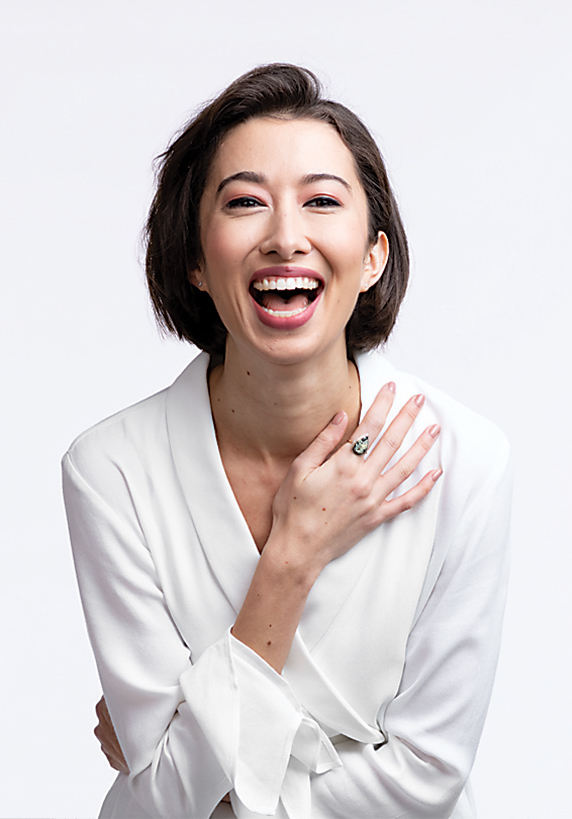
on beauty standards:
“Beauty has historically been taught as the epitome of what a woman should be.”
Vanessa ulrich | Senior Director, PR at Sage Growth Partners
Marciari-Alexander: I’m not there yet, but I do it intentionally because I have so much gray hair now. My daughter’s like, “Are you sure?” and I say, “Yes, I’ve earned this!”
Wilkins: This sounds so horrible to say, but I have a lot of insecurities. Weight has always been my struggle. Stretch marks just started to appear places like on my belly and my arm. I thought you got stretch marks on your belly when you have a baby, not from just being a regular person. Recently, I went to a bachelorette party with my sorority sisters, and while I feel like I’ve grown to be more comfortable in my own skin, it was like zoom, I’m back to 2007 feeling like I’m the biggest one in this sorority line. I am constantly trying to combat that inner struggle. And through combatting it, I find my confidence.
Ulrich: It’s so important that we talk about the fact that we all have insecurities and off days. If you are in the public eye, people might think that we look perfect all the time, but that’s just not the case.
Aslani: It’s not a big insecurity for me, but I’m Persian, and all Persians get their noses done. It’s like a rite of passage, like all of my cousins got their noses done when they were 16. I think Iran, or more specifically Tehran, is one of the number one places for rhinoplasties. I was there a few weeks ago and my family were all asking me if I wanted to get my nose done.
Marciari-Alexander: I would give anything for your nose.
Aslani: And I always say no. I inherited my nose from my dad’s side of the family. I’m pretty happy with it, but thanks for pointing it out to me. So, I’ve always thought that my nose wasn’t perfect, but you know what? It’s my face. I don’t want to get another one. I’m happy with the one that I have.
How do you deal with unrealistic beauty standards?
Wilkins: I remember when I first realized that you could edit the width of your face on an app and I thought, “This is so amazing. I look so skinny!”
[Everyone laughs]
Wilkins: Slowly but surely, I decided that I had to stop using this, because it was not truly me. If I’m going to have this blog where I am supposed to be about body positivity and I’m going in and making my cheeks a little bit smaller, then that’s not truthful. But I look at everyone’s pictures and I think, well, everyone else is probably doing it to some extent. The Facetune app is rampant, and everyone is going in there and changing their look. You don’t even realize it because all you’re seeing is this little square on Instagram.
Bolden: I have a daughter, and she watches YouTube videos, and I remember one time she was like, “I want my hair long and straight like her,” pointing to a little white girl in the video. And the little girl was beautiful, but I had to explain to her that’s not your reality. My goal is to just keep telling her how beautiful she is. I tell her she is beautiful every single day. I tell her how much I love her hair every single day. She has thick curly hair, and I tell her how much I love her hair every single day because I never want her to think differently.
Aslani: My mom always told me to not compare yourself to someone else, because you don’t know what they are going through, and you don’t know their struggles. As far as social media goes, people are only going to show their happy moments. I’m not going to share a photo of me when I’m sobbing and crying and can’t reach the 20 deadlines in front of me.
Are you worried about aging?
Wilkins: Black don’t crack.
[Everyone laughs]
Bolden: That’s what I thought of.
Marciari-Alexander: I didn’t know about that.
Wilkins: You haven’t heard that before?
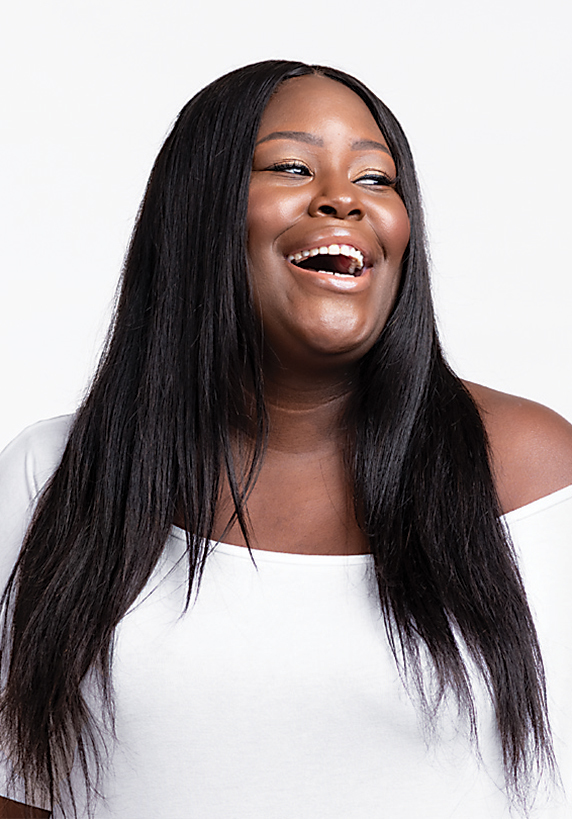
on self esteem:
“I am constantly trying to combat That inner struggle. And through combatting it, i find my confidence.”
alexIS wilkins | Event Planner
Marciari-Alexander: No, that’s awesome.
Wilkins: I just turned 30 in April, and I went and got a facial and the esthetician asked what I needed, and I didn’t really know because I have really good skin. But once she found out I had just turned 30, she recommended the anti-aging treatment, and I’ve literally never even thought about anti-aging before, but that made me think maybe I should be. Brands keep pushing it on us to the point that you feel like you need it.
Bolden: I think people are freaking out over nothing, but I’ve also never gotten into the whole anti-aging thing. I just take care of my skin and don’t think about aging because it’s inevitable. Everyone is going to get older, and you’re going to age.
Aslani: I started using under-eye cream when I was 24 or so because I am predisposed to getting dark circles under my eyes. My mom always told me from the time that I was like 12 or 13 to take care of my skin. The products I use need to be preventative so that I don’t have to use dark spot anti-aging wrinkle cream in the future. Who even knows if these creams actually work? There are products that are upward of $300 to use on your face. I’m perfectly fine with the stuff I find at the drug store.
Ulrich: My whole thing is nutrition. I’m not afraid of aging, but I know that if I eat well now my skin will look good now and later. My mom’s a big hippie, so she’s always been all about science-based nutrition. I think the only thing she’s ever put on her face is glycerin, like actual 100-perccent glycerin from a health food store. Growing up, I never saw her with a skincare routine, but there was always a really balanced meal on the table.
Marciari-Alexander: As the old lady in the crowd, I would say that I am cheap, so I’m not spending money on that stuff! Someone once said to me if you start getting plastic surgery in your 30s or your 40s, you’re going to have to get it again in your 50s and your 60s. I think if we say we are proud of our bodies and ourselves then let’s be proud. We’ve earned our wrinkles, let’s own it. I look at somebody like Gloria Steinem, who I don’t think has had work done, and you look at Catherine Deneuve or Jane Fonda, and you can see the difference in how they look. One looks natural and proud, and the others no longer look like themselves. I think part of my aversion to plastic surgery was also that I got my hair done for a wedding when I was 30 and they pulled my hair so tight that it actually looked like I had a facelift. I looked so scary, and that was the end of that.
Why do we have such a hard time believing we are beautiful? What have you done to learn to love yourself?
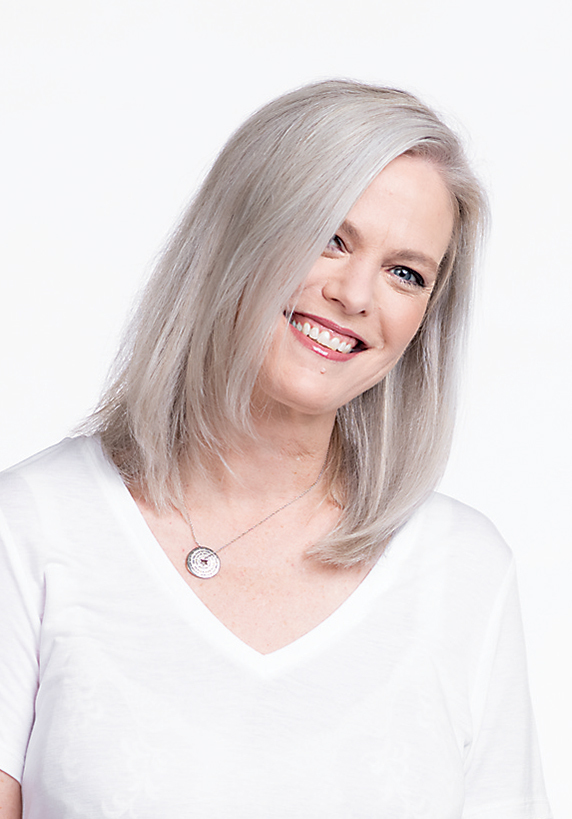
on comparison:
“We need to understand that it's now human to feel like it's our job to compare ourselves to others Because we’ve been trained by a really long history to do it.”
JULIA MARCIARI-ALEXANDER | Executive Director, The Walters Art Museum
Wilkins: I think it’s just about overcoming the constant comparisons. That’s what really drives it and, in an age where all you are doing is looking at other people’s pictures, lives, and things that they’re doing, it’s so hard not to compare.
Marciari-Alexander: There is a really long history of putting people into visual boxes. This is why I think it’s important that we go to museums and that we learn to be incredibly savvy visual consumers. What we are doing now on social media is no different from what they were doing in 17th-century England or in an African country where they have beauty norms about what neck braces to wear, or in China, where they bound their feet. Every culture has its beauty norms, and those norms have been visually reinforced for thousands of years. We need to understand that it’s now human to feel like it’s our job to compare ourselves to others because we’ve been trained by a really long history to do it. We’ve kind of been brainwashed. But we do have the tools to become good visual consumers, and we have the responsibility to teach our families not to feel like they need to conform. Everyone needs to choose their own path, and I would just encourage everyone to step out and recognize that what is put in front of them and what is considered the standards of beauty so they can then decide what they want to do.
Aslani: I agree. I think it’s just human nature. It’s been a part of our history and will be a part of our future in the digital age. Everyone’s compared themselves to someone else at some point, but as you mature and get older and wiser, you’ll become more comfortable in your own skin. I am comfortable in my skin right now. People can comment and say, “You’re not showing your hair” or “You’re covering too much,” and your opinions are your own, but at the end of the day, I’m comfortable with who I am, what I’m wearing, and how I’m presenting myself, and that is when I feel beautiful.
The Male Gaze
While we tend to focus on the impossible beauty standards applied to women, men also deal with challenges related to appearance, masculinity, and the ever-shifting male ideal. so We HAD a conversation about the male stance on beauty, self-acceptance, and the effects of social media when it comes to a man's appearance.
Noah Mumaw
Founding Partner & Co-owner of Monument Sotheby’s International Realty, 40
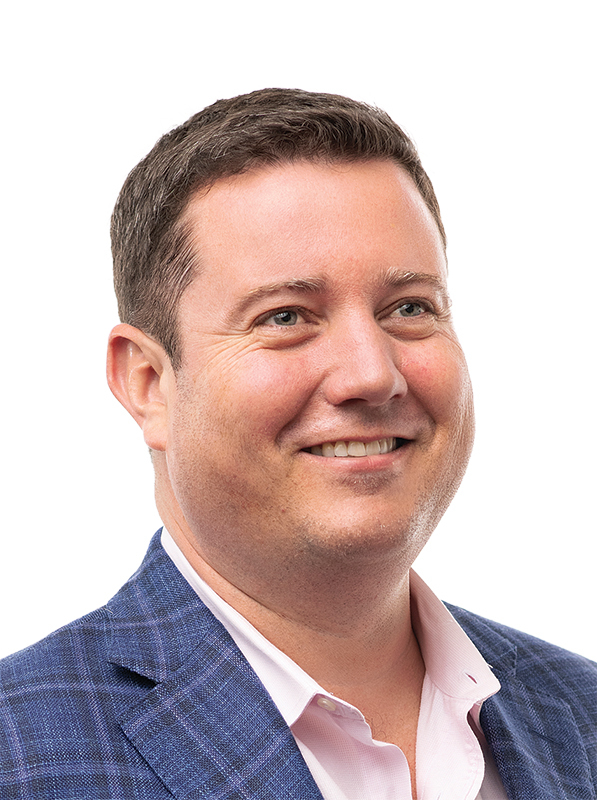
ON BEAUTY: Well, there are different types of beauty, right? There is physical beauty, and then there is the beauty a person has inside them.
ON SELF-LOVE: I have a cowlick in my hair, and when I was younger, I wore my hair longer because of it. I’m sure my parents dismissed it and made me feel like it wasn’t important. But I have three young sons, and I see in my two older kids the stuff that bothers them. It may not feel like a big deal, but it is to them, and it’s important to treat it that way.
ON SOCIAL MEDIA: If Instagram went down tomorrow, there’d be 100 million models that went out of business! It’s a lot more in everyone’s face than it used to be. I worry for my kids with everything being at their fingertips. They see things online and they think that it’s true. But really there are these billion-dollar companies that are in control, and it’s scary.
Rahzé Cheatham
Opera Singer & Model, 22
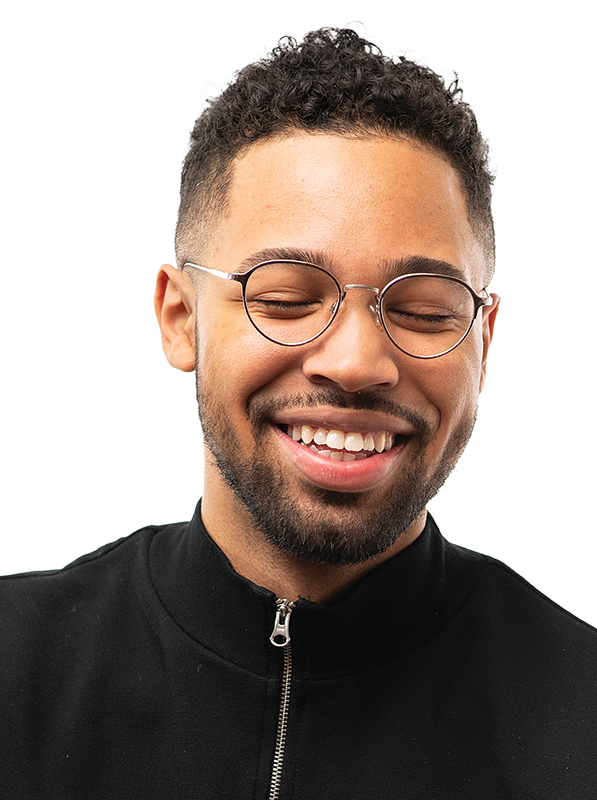
ON BEAUTY: Beauty is often not determined by us but is determined for us. It has become this tri-part entity where it’s what “society” says, what we think we are, and what others perceive us to be. What beauty really is is a series of smoke and mirrors.
ON SELF-LOVE: I identify as non-binary or gender non-conforming. So I feel my entire gender identity is forced onto me, and accepting this body as my body is something that I have to do every day just because people keep trying to insist that these physical attributes [looking like a “man”] mean something.
ON SOCIAL MEDIA: Being a black-identifying person, it’s strange to have your natural features demonized and then to see other people adapt them for themselves and be praised. Rather than people like me seeing this and thinking, “I’m beautiful,” we hate ourselves more because we don’t look exactly like those people. It’s a very strange cycle of self-hate.
Coffin Nachtmahr
Toy Maker and Artist, 26
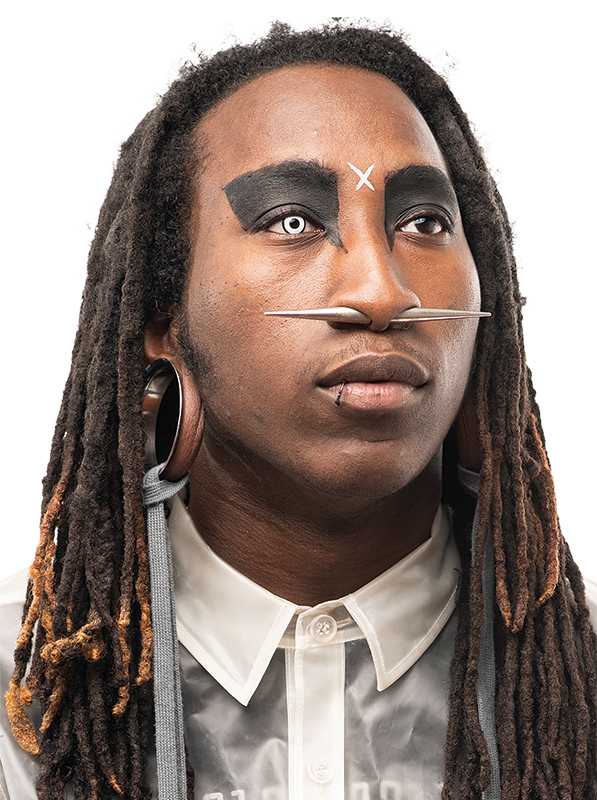
ON BEAUTY: I think a person being themselves unapologetically makes them beautiful.
ON SELF-LOVE: When I started to express myself through my outward appearance, I felt like what people expected of me and who I knew myself to be were completely separate. I think that’s what brings some of the shock value to people I meet, because the way that I look is different from the person they get to know. I can dress extreme, or I can wear a suit, but either way, it’s uniquely me.
ON SOCIAL MEDIA: I personally feel like if it has done anything, it has alienated more people or created such extreme standards that everyone looks like a clone. There’s no in-between space, and that’s so strange to me. There are very defined standards in pop culture and social media, but that isn’t real culture. Reality and social media translate almost like a text does to a phone call; they convey different tones.
Ryan Detter
Software Engineer at NASA Goddard, 39
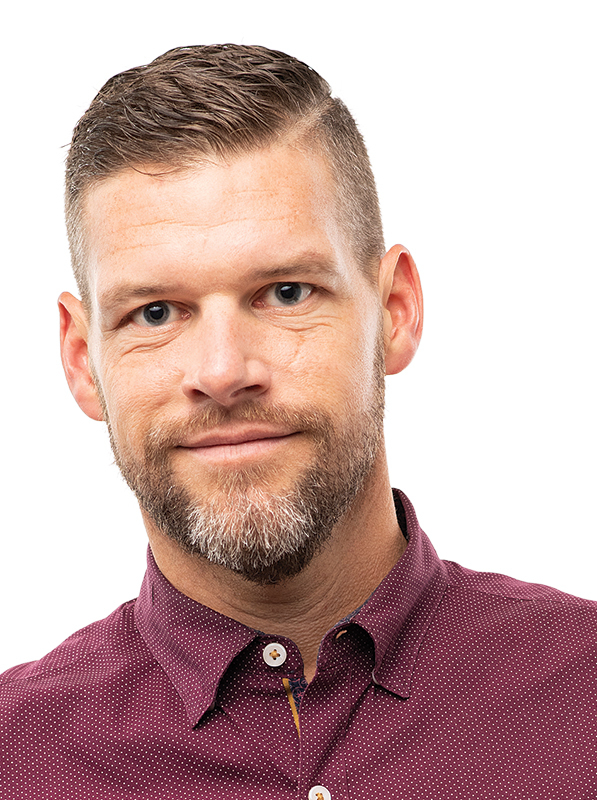
ON BEAUTY: I’ve found more beauty lately in moments I’ve shared with people. Like at the end of the Baltimore half-marathon when I was waiting for all of my buddies. It was a beautiful moment because we went through something big together.
ON SELF-LOVE: It’s never been something that I’ve had an issue with, but I have scars on my face. I’ve had them since I was two months old, and people are very sensitive about that around me, not realizing that because I grew up with it, I never look in the mirror and see my scars. It’s all I’ve known.
ON SOCIAL MEDIA: For guys, it’s very anti-selfie on social media. I hear selfies are anti-masculine, and I’ve even had a friend be like, “You post selfies? What?!”——but to me it’s just owning it. I don’t want to come off as vapid, but you know if I’m wearing a tux today, I’m going to freaking take a picture of it—it’s bad-ass.
